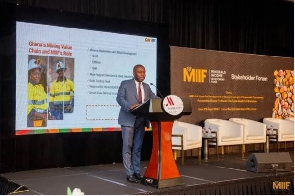 Chief Executive Officer-MIIF, Edward Nana Yaw Koranteng
Chief Executive Officer-MIIF, Edward Nana Yaw Koranteng
The Deputy Minister of Lands and Natural Resources responsible for Mines, George Mireku Duker, has instructed two agencies under the ministry to collaborate with the University of Mines and Technology (UMaT) to design educational programmes related to extraction, processing and governance of critical minerals.
The two agencies – the Minerals Income and Investment Fund (MIIF) and Minerals Commission (MinCom) – are to immediately work with UMaT on this to develop the framework for redesigning and strengthening the existing curricula.
To this end, Mr. Mireku Duker specifically also asked that MIIF and MinCom take deliberate steps to provide scholarships to technical staff and some students for the study. The intention, he added, is to build regulatory capacity and local graduates to match the sophisticated interests of companies that will exploit these minerals in the future.
“We shouldn’t start mining lithium then a company goes to hire a metallurgist from country ‘A’ with the excuse of Ghana not having qualified personnel,” he said.
The Deputy Minister, who was speaking at a stakeholder forum organised by MIIF in Accra, added that there is more to be done.
The latest directive reflects concerns to address the growing importance of critical minerals in the context of energy transition, with an emphasis on education and collaboration between government entities and educational institutions to enhance expertise and ensure responsible resource management.
The critical minerals that the country continues to make discoveries of are likely to include those used in renewable energy technologies, such as lithium, bauxite and iron among others.
The call also comes at a time the ministry has announced it is working closely with government to unveil a new policy document to guide exploitation of the emerging green minerals sector.
It is hoped that the policy will end exports of critical minerals including lithium, bauxite and iron among others in their raw state, which denies the country opportunity to add real value into the economy.
The Minister of Lands and Natural Resources (MLNR), Samuel Abu Jinapor who recently disclosed this stated: “A technical committee is finalising a policy document on the exploitation, management and utilisation of our green minerals, including lithium, for the consideration of Cabinet”.
Speaking at the ‘Natural Resources Stakeholder Dialogue’ held in Accra, the minister said: “Our goal is to ensure that, as much as possible, we retain the value chain of these and other minerals in our country’s future”.
Meanwhile, Chief Executive Officer-MIIF, Edward Nana Yaw Koranteng, has announced that MIIF plans to finance the development of a database for all critical minerals in the country.
He added that critical minerals have now become a strategic and security interest globally. The initiative is situated on the 22 strategic critical minerals identified by the United States of America (USA).
“We are working with the Ministry of Lands and Natural Resources, Geological Survey Department in developing a data-bank of all our critical minerals, which include gold, lithium and salt,” he stated.
He said industrial salt, for instance, boasts a staggering array of applications numbering approximately 14,000. These applications span vital sectors such as pharmaceuticals, bicarbonates, oil and gas among others.
He posited that in the West Africa sub-region only Ghana and Senegal have the potential to produce industrial salt.
It is against this background that he mentioned developing even 50 percent of the about-41,000 acreage of salt assets, at Ada-Songor in the Greater Accra Region, comes with a potential of making the country the leading industrial salt producer on the continent.
The MIIF stakeholder forum was held in Accra and organised under the theme ‘MIIF as a lever for development in Ghana, investing in a responsible, transparent accountable manner to secure the future wealth of Ghana’.
The event brought together several industrial experts – including civil society organisations (CSOs) – in resource governance transparency to deliberate on the work of MIIF so far and the way forward.